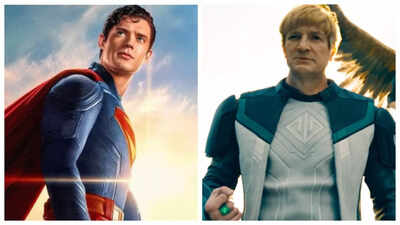Foundation returns to Apple TV+ this week, jumping ahead 152 years and plunging its characters into an end-of-the-world scenario. One of the key figures is Hari Seldon, played by Jared Harris. He created the Foundation in season one as a way to preserve civilization after his “psychohistory” predicted a coming age of darkness. In the wild drama that’s followed, we’ve seen Hari die and then resurrect as separate digital clones, one of which ended up getting a new human body in season two.
It’s complicated! Foundation is a show with many layers, and Hari—already a character who can be in two places at once—is maybe the trickiest one of all. Ahead of the season three premiere, io9 got a chance to talk to Harris about what it’s like playing simultaneous yet very different versions of the same man and what challenges Hari faces as the stakes rise in season three.
Cheryl Eddy, io9: As season three begins, we see that the Hari Seldon that’s part of the Second Foundation is now very, very elderly. This is the Hari that received a second-chance body in season two, and he’s made the choice to let Gaal stay in cryosleep while he stays awake for all those years instead. Do you think that was a tough decision for him to make?
Jared Harris: Well, it wouldn’t be the first time that he sacrificed himself. He does that in the first season, although this one seems pretty final. I think it comes about as a realization that because of the events of the first season, they have not been able to create the Second Foundation at the point they were supposed to, and they have to play catch-up, and they’re going to do it Gaal’s way. But also, Gaal’s life is more valuable than his. It’s really a kind of passing of the baton, if you like.
io9: We never do learn how that body comes back to him. It’s a real sci-fi mystery. And then when he expires, he goes to a mysterious place too. Did you have any theories or ideas about what was going on there?
Harris: I had questions—they don’t answer them for me either. I was like, ‘Why has he got this? Am I a robot? Am I a human being? What am I?’ ‘No, you’re not a robot. You’re definitely a human being.’ We also know that cloning technology exists within this world.
Where [Hari goes]I’ve got no idea. I mean, I asked. You ask those questions when you’re on set, and they just sort of nod and go, ‘Yeah, it’s a good question.’ And then you realize you’re not going to get an answer. So I can’t help you. [Laughs]
io9: That’s one of the things I really like about the show, though, is that it doesn’t spell everything out for you. Sometimes you maybe will have to rewind a little bit to be like, ‘Wait, what just happened?’ and then come up with your own answers.
Harris: I think that’s one of the secrets of a successful show, is if they’re able to engage the audience in using their own imagination in filling out the unknown areas of the show, and it demands a certain amount of patience. It’s what you don’t get if you dump all the episodes all at once and encourage the audience to binge, because then any questions they have are going to be answered when they just start up the next episode. So I think it’s a good thing to make them wait and then have to engage their own mind and their own imagination as to what may or may not happen.
io9: To quote the show, “Foundation has become comfortable” in season three. How would you characterize Hari’s role—hologram Hari’s role—the way the Foundation is now, after so much time has passed since it all began?
Harris: In the intervening time between two and three, the Foundation’s moved out of what they call the religious phase, and it’s embraced the science that is available to them. And I think that that role that he was playing previously has become something of a straitjacket to him. I remember I said that last season Hari was up on Mount Olympus, and this season, I think he wants to come back down to earth.

IO9: Foundation is a show that features different versions of the same characters. There are the Cleon clones, of course, but Hari’s situation is even more complicated. How did you sort of plot out the variations in your performances, from original Hari to the hologram Haris to the hologram Hari that becomes human again?
Harris: Well, they’ve gone through very different experiences. One of the things that I attached to, and [discussed] in my conversations with the writers and the directors of the episodes, was the Hari that exists who’s with Gaal—you don’t go through what he experienced without it profoundly affecting you, and to some degree you’re never going to be able to shake that off. So he’s damaged to some level that he will never be able to overcome.
And then the other version of Hari has had a little bit of a wake-up call from last season in that he realizes that he’s sort of a figment of somebody else’s imagination. His digital consciousness has been digitally altered by corporeal Hari, or the other version of himself, or previous version of himself, and that’s shaken him. He’s going through something of an existential crisis. So you take all those strands with you and see where you can use those ideas in the performance of a scene.
io9: One of the big themes of Foundation that really comes out in season three is the burden of knowing what the future will bring—and the different ways people react to that. Do you think Hari is optimistic about humanity’s chances, even after all he’s seen and been through?
Harris: I think he’s definitely optimistic about it. You’d have to be. And I think that the version of Hari that’s with Gaal, I think the reason why he feels he’s willing to make the sacrifice that he makes is that he feels that she’s going to be able to succeed, given her incredible intelligence, her facility to understand the complexity of psychohistory, and this other [extra-sensory] gift that she has.
I think the other version of Hari is probably trying to figure out what his role is. And is he going to be happy with that role, given that he thought he was the one who was handing out the parts? He didn’t realize that he had his part handed to him.
io9: That’s one of the things I love about science fiction. It could be a story about the world maybe ending, but there’s also optimism and hope that can be found, which I think is the kind of story we need right now especially.
Harris: I mean, stories without hope are tough to get through, you know. [Mad Men’s] Matt Weiner described it as like sticking your face in a toilet. Yeah, you need hope.
Foundation season three premieres July 11 on Apple TV+.
Want more io9 news? Check out when to expect the latest Marvel, Star Wars, and Star Trek releases, what’s next for the DC Universe on film and TV, and everything you need to know about the future of Doctor Who.




















































